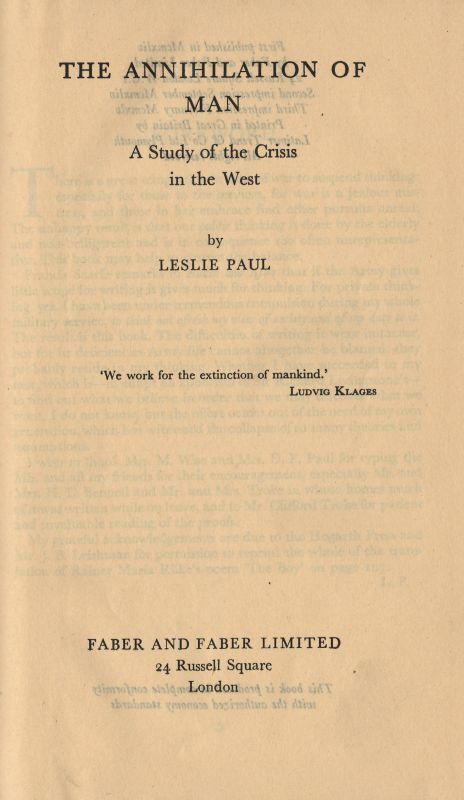Paul, The Annihilation of Man.
The Annihilation of Man. A Study of the Crisis in the West.
Third Impression. London, Faber and Faber Limited, 1945. 21cm x 13.5cm. 200 pages. Original Hardcover with protective Mylar. Very good condition with only minor signs of external wear. Some textmarkings.
Includes for example the following chapters: St. George and the Dragon / Why Germany is at War / Why Britain is at War / Is Capitalism the Cause of War? / The Enigma of Fascism / The Enigma of Marxism / The Enigma of Christianity /The Revolt of German Youth / The Rise of State Worship / Anti-Semitism / The Smell of Faggots / Fascism seeks the Masses / etc.
Leslie Allen Paul (1905, Dublin – 1985, Cheltenham) was an Anglo-Irish writer and founder of the Woodcraft Folk.
Born in Dublin on 30 April 1905, Leslie Paul grew up in Honor Oak, South East London, the second child of advertising manager Frederick Paul and registered nurse, Lottie Burton. The family was fairly large, consisting of three sons and two daughters including younger siblings Joan and Douglas.
During his materially poor but culturally rich childhood, Paul contributed dramatic poetry recitations to family/neighbourhood entertainments. He later recalled performing a vignette called ‘Two Coons’, which gave a sympathetic representation of African culture.By the summer of 1922, Paul was a junior ledger clerk employed in the City (near Aldgate) at the International Stores on a weekly salary of 22 s. 6 d.
In 1923 he joined his father’s firm Pantlin and Paul in Fleet Street, hoping to find a way into freelance journalism. He actually succeeded in becoming editor of a magazine called ‘The open Road’, but the magazine failed after only six months. During that six months Paul attempted to become a freelance journalist, and wrote the unpublished ‘The Journal of a Sun Worshipper’. During this period Paul came under the mentorship of Charles Watson, a retired unionist, bookseller and Swedenborgian. Watson loaned Paul books from his bookshop which were to have a major influence on Paul’s political and social thinking. Another influence was Harold Laski, whose powers of oratory influenced Paul’s thinking and writing style.
During the 1930s Paul seems to have worked as a freelance journalist. He was also employed in London educational and social work, as well as working on the continent with refugees. He was a tutor with the London County Council as well as the Workers’ Educational Association. In 1932 Paul published his strongly autobiographical first novel ‘Fugitive Morning’.
Paul’s political views at this time were inspired by H. G. Wells, William Morris, and Edward Carpenter, while his ideas about children’s education were partly drawn from Rousseau’s Emile. In addition, Paul was also active in the pacifist No More War Movement. Paul was an outspoken critic of the Axis powers, as well as the Soviet Union following the latter nation’s signing of the Molotov–Ribbentrop Pact. After the outbreak of World War Two and the rise of fascism, Paul abandoned his pacifism and supported the British war effort.
(Wikipedia)
- Keywords: Catalogue Twelve – Philosophy · History – Rare · Philosophy of History · Philosophy Rare · Political Science – Rare
- Language: English
- Inventory Number: 29952AB
EUR 68,--
© 2025 Inanna Rare Books Ltd. | Powered by HESCOM-Software










